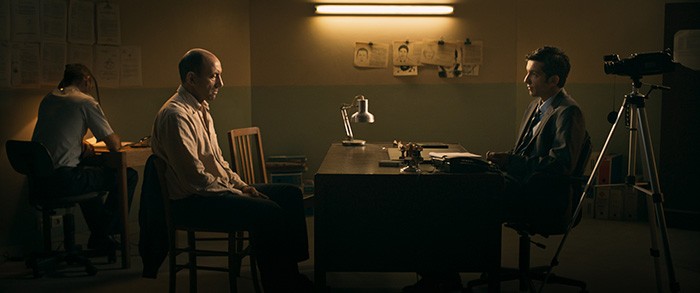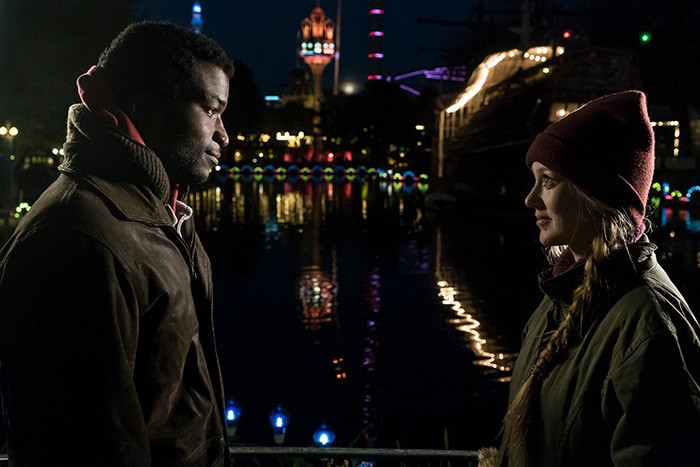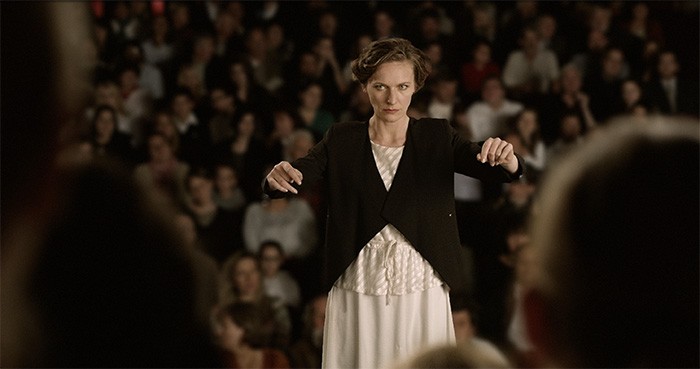Ahead of the Academy Awards, we’re reviewing each short category. See the Live-Action section below and the other shorts sections here.

Ennemis intérieurs – France – 28 minutes
The definitive exchange in Hidden Figures—the one that defines America then and still today—is when Kirsten Dunst’s personnel manager tells Octavia Spencer’s yet-to-be-given-the-title supervisor, “Despite what you may think, I have nothing against y’all.” Spencer’s Dorothy Vaughan counters without missing a beat, “I know you probably believe that.” It’s such a perfect distillation of how racism permeates the very core of who we are to the point where we don’t even understand why we are racist. It happens all the time now, white people accusing black people of screaming racism as a knee-jerk reaction because they believe their racist actions are normal. Their fear has made it so other colors are inferior, dangerous, and untrustworthy. In their minds they aren’t racist. They’re practical.
Just look at the state of affairs today with the Muslim ban and how half our nation is willing to put color and religion above humanity. But they don’t believe they’re being racist because they’re doing it under the auspices of security. They’re “looking out for their own” without realizing “their own” has warped from Americans and people in general into Americans who specifically look and live like them. As Hidden Figures shows, this isn’t a new concept. And as Selim Azzazi‘s short film Ennemis intérieurs corroborates, it isn’t solely an American reaction. Every nation has a history wherein populations have been usurped, integrated, or evolved. Every nation has seen prejudice—whether warranted or not—and inevitably forgave itself under the umbrella of national pride.
This is the crossroads where we meet an Algerian seeking French citizenship (Hassam Ghancy) opposite a French interrogator of Arab descent (Najib Oudghiri). Both were technically born Frenchmen (Algeria was under France’s rule at the time of Ghancy’s birth), but politics and war have made things more complicated. The interview advances swimmingly at first with everyone cordial and forthcoming until religion is brought up. Ghancy suddenly tenses and Oudghiri leans in with confidence and control. Words are twisted and assumed, the interrogation moving from citizenship to suspected terrorism. “Just give us a few names and we’ll give you a positive review,” says Oudghiri. Show us that we can trust you as an informer—not as an equal, but an object for us to wield.
Oudghiri effortlessly chastises Ghancy for falling back on notions of racial profiling as though he is the one at fault. You may even believe it—that he does have something to hide. Azzazi expertly allows the story to unfold in a way where our entrenched ideas of good versus evil kick in before we’re aware of all the facts. We take authority (Oudghiri) at its word and ostensibly hold the suspect (Ghancy) as guilty until proven innocent. Only then do we discover why Ghancy was guilty, why he has a criminal record and why he won’t name names. It’s a rousing reversal, his conviction inspiring to behold. But as in life, so goes fiction. It doesn’t matter that Ghancy is justified or right because he remains the “other.”
We’re given two men who look the same, speak the same, and live the same. The only difference is that one is on the “right” side of the desk and the other on the “wrong.” This dichotomy is why someone like Trump can deliver out-right lies and not be crucified by supporters. This is how labels and titles become more important than ideals and hope. A world becomes educated by a lie and eventually makes that lie true. It doesn’t matter that an Algerian in France meets other Algerians for a sense of belonging the French won’t supply. Algerians meeting automatically connotes terrorist cell. Fear is now our driving force, our abhorrent actions towards the “other” sanctioned by those in power. Will our eyes ever be opened?
A-

La femme et le TGV – Switzerland – 30 minutes
While its age-old conceit of a misunderstood curmudgeon discovering joy after being perpetually caught in a cycle of monotony is familiar, Timo von Gunten‘s cutely inspiring La femme et le TGV is in fact based on true events. The woman at its center is Elise (Jane Birkin), a baker left alone after her husband passed on, her son (Mathieu Bisson‘s Pierre) moved away, and her clientele gradually enticed by a cheap German bakery with unbeatable prices. She rides her bike to town, sits at her counter, and waits for the one customer who continues stopping by. The rest of her time is spent shooing away disrespectful youths like Lucien Guignard‘s Jacques, the fast-driving boyfriend of the dance instructor across the street whose car keeps blocking her storefront.
That’s Monday through Friday, a routine spiced with excitement in the form of the TGV coming and going down the train tracks directly outside her house’s window. She’s waved at this locomotive for decades, first with young Pierre and then by herself. One alarm clock wakes her in the morning and another readies her for the evening’s trip back, her Swiss flag flapping in her hand as the driver honks his horn. This is the light within her otherwise drab existence. Everyone leaves her alone because she pushes them to, her son badgering her to shutdown her business and settle in a retirement home. And maybe she’d have finally agreed to do it too if not for a piece of paper flung from that steady train.
It’s a letter from Bruno the conductor (Gilles Tschudi), a man so touched by the constant salutations that he had to say “thanks.” From there he and Elise begin a correspondence, this aged woman smiling again in public and shocking the locals who learned to keep away. Only Jacques is unfamiliar with her enough to not run in fear. He sees her as a human being like Bruno, the façade built by years of existential crises penetrable after all. Suddenly the notion that our lives evolve in fate’s hand until there’s simply nowhere left to go is replaced by one of optimism and promise for the future. Past tragedies are just that: the past. Life forever remains possible, happiness in reach if only you’re willing to grab hold.
B

Silent Nights – Denmark – 30 minutes
It’s extremely difficult for me to blindly accept a film like Aske Bang‘s Silent Nights on faith. The idea that someone can do bad things—no matter how good he/she is at heart—and continuously be rewarded is a tough sell. But that’s exactly what this look at immigration through a charitable Danish lens attempts. A man may be a saint, but that doesn’t excuse thieving, adultery, or lying with ease. I understand the message comes down to “hard living” and “impossible decisions,” but the film’s result is less a heartfelt expression of this reality than it is showcase of naïveté on the part of his victim. No matter how much the filmmakers hope to portray humanity and compassion, my cynicism only found implausible hokum.
Aske and co-writer Ib Kastrup do whatever they can to let Ghanaian immigrant Kwame (Prince Yaw Appiah) appear complex and sympathetic at the start. We watch him steal a bike and think, “I’ll give him that one.” We see his temper flare when the homeless shelter Inger (Malene Beltoft Olsen) works at turns him away for being full and think, “It’s heartbreaking, but what can you do?” And when he calls his wife (Hassana Sampah) back home in Africa we find ourselves at a loss to the human tragedy poverty and injustice creates. We hope he’ll get on his feet, knowing Inger is the person to help. So we must ignore the foreshadowing of her yearning for a man, our fears that they’ll fall in love inevitable regardless.
Every time they smile at each other made me cringe for what’s coming. Aske and Kastrup move to throw the kitchen sink to elicit emotion from us, doing so in a way that exposes the machinations of their goal. As soon as things are introduced, we’re made to fear the worst all because Kwame is married and yet willing to be with Inger anyway. This revelation forces us to prepare for heavy fallout early on, our senses put on full alert when a cabinet of money at the shelter is used or when Inger’s mother (Vibeke Hastrup) exposes herself as a racist drunk. You simply cannot successfully integrate the amount of politically and emotionally charged incidents included in these thirty-minutes and ever believe it’ll feel authentic.
The whole becomes preachy and full of martyrs rather than individuals worthy of happy endings. I’m not saying Inger and Kwame don’t deserve happiness; I just don’t buy them achieving it without lying to themselves about what happens. The ramifications of their relationship are much weightier than a cry and intentionally vague advice can fix. Yes incidents like this probably do happen, but condensing it into such a short runtime does a disservice to the characters’ ability to traverse their ups and downs with genuine care. The ending rings false if not also hollow, the places their common trajectory takes them a foregone conclusion rather than natural progression. The film’s heart might be in the right place, but it failed to take my brain along for the ride.
C

Sing [Mindenki] – Hungary – 25 minutes
A new candidate for cinema’s best villain of 2016 emerges out of Kristóf Deák‘s Hungarian short Mindenki [Sing]. Her name is Miss Erika (Zsófia Szamosi), the Middle School choir conductor in charge of her school’s nationally recognized troupe of youngsters readying to defend their previous championships. She seems so wonderful and the kids who love her love her, but there’s more to her actions than kind-hearted and pure leadership leaving each student with a chocolate candy upon class end. Beneath this façade adored by principals and parents alike lies a cruel vindictive streak where victory becomes something to be achieved at all costs—including that of exploiting the innocence of youth and the weight of her authoritative position.
It’s difficult not to watch without seeing the allusions to America’s own charlatan-in-charge proving over and over again that lies are okay if they lead to his desired end-game. Here’s a teacher—a figure we are raised to respect with an unwavering loyalty despite questionable actions—who is quick to disseminate rhetoric about life not being fair but staunch in her refusal to lend those sentiments to herself. Rather than be about two girls (Dorka Hais‘ “Miss Popularity” Liza and Dorka Gáspárfalvi‘s newcomer Zsófi) opening their eyes to the injustice of an adult they believed in, this film is a metaphor for citizens finding the strength to stand-up to their oppressors. It’s about the power an underdog leader can wield in the fight for equality.
But it’s also a beautifully shot, nicely performed film with huge ambition. There’s a schoolyard sequence around halfway through where the camera weaves in and out of the children at play while Liza and Zsófi sing aloud their hand clapping game. Not without its moments of obvious calculation (a couple children seem as though they were motionless before moving on cue as the camera approaches), the set piece wonderfully portrays these children in their natural habitat at play—a universal notion of uninhibited expression that’s being stifled inside the schoolhouse doors. This is their in-plain-sight domain with which to plan their revolt, itself a humorous and empowering transfer of control. United we stand and united we fall. No one person should ever be above justice.
B+

Timecode – Spain – 15 minutes
A Spanish parking garage owner (Vicente Gil) cuts costs by hiring two security guards to work twelve-hour shifts—eight paid on the clock and four off. It’s a pretty cozy gig wherein you simply watch closed circuit camera feeds, do a couple walks, and let the automated ticket machines do the heavy lifting as far as payments go. There’s a system to everything, the well-oiled machine of professionalism mixed with boredom. Luna (Lali Ayguadé) arrives each morning on a schedule, changes into her uniform, pulls up her hair, and punches in. Her greeting with night shift guard Diego (Nicolas Ricchini) is politely curt and he responds in kind. They sit. They watch. They walk. And they go home before doing it all again, time clicking in perpetuity.
Director Juanjo Giménez Peña wonderfully ensures we understand this regimen’s consistency during the start of Timecode because he’s about to throw in a wrench. A complaint was lodged with the owner that a customer’s car taillight was damaged in the garage. He doesn’t believe it—his hostility a delight in its holier than thou egotism—but asks Luna to run the tapes just to confirm. What she finds is surprising. Not only did the damage occur in the garage, Diego was the perpetrator. There’s more to this revelation than mere property damage, but I’ll let you discover that yourself. Just know that Peña’s short film is more than the ethical quandary of turning a coworker in or covering for him. It’s actually a nuanced romantic comedy instead.
What follows is a series of unspoken “love letters” left via Post-It notes and timestamps. The regimen becomes slightly unhinged as Luna and Diego’s lethargic “sleepwalking” is replaced by enthusiasm. They continue with short pleasantries upon meeting at shift change, but then quickly rewind the feeds to see what the other created in their absence: a sweetly charming exchange of bare personalities and soulfully expressive visual communication. And just when you think another snag occurs, Peña does what he must by sharing a rousing collision course we’ve been waiting to experience from the beginning. Add a perfectly laugh-out-loud punch line from Pep Domenech before cutting to black and you receive a memorable tale immortalized in the past by technological permanence. Two become one as only they know how.
B
The Oscar Nominated Shorts are in limited theatrical release starting February 8th. See the official site for more details and our reviews of the other shorts sections here.

